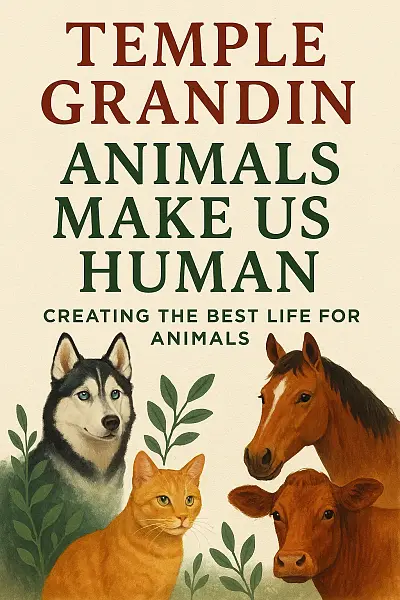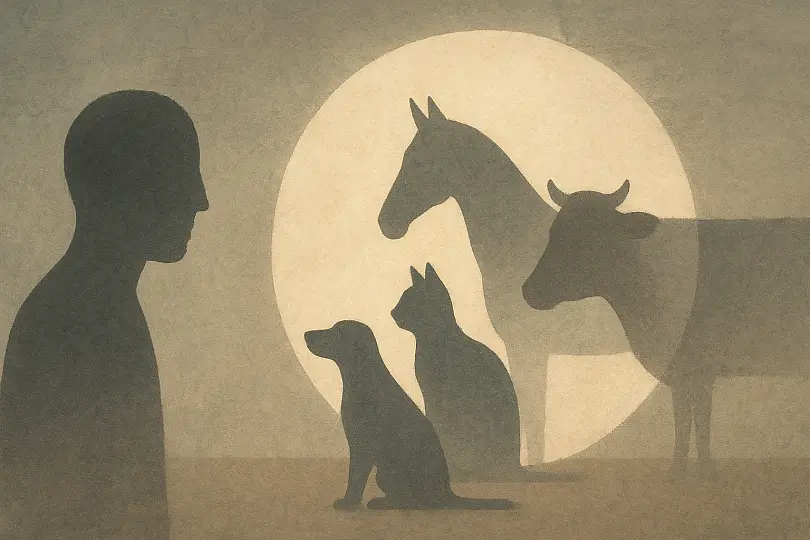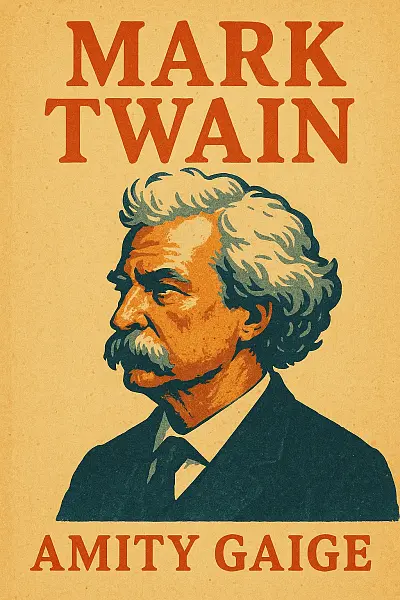
Animals Make Us Human: Creating the Best Life for Animals
by: Temple Grandin
Temple Grandin—animal scientist and autism advocate—dives into the fascinating world of animal emotions, inviting us into farms, homes, and zoos where our everyday creatures live. She’s determined to uncover what truly makes animals happy—not just comfortable, but emotionally fulfilled.
Then comes the big question: are we meeting our animals’ core emotional needs, or are we just assuming we know best? Grandin challenges conventional wisdom, urging caretakers to see the world through their animals’ eyes, risking lost connections if they get it wrong.
With her friendly, down-to-earth style, Grandin asks: Will we really listen and give animals the best life possible?
"To truly care for animals, we must first learn to see the world through their eyes, not just our own."
Let's Break This Down
The Author's Voice
Atmosphere
- Inviting and inquisitive, the book radiates curiosity about animal welfare, naturally blending scientific exploration with heartfelt compassion.
- There’s a gentle earnestness underpinning every chapter, creating a mood that’s equal parts informative and empathetic.
- Expect a plainspoken, approachable vibe—Grandin never talks down to the reader, instead offering a warm, welcoming space for learning.
Prose Style
- The narrative voice is clear, practical, and unpretentious, full of real-world examples.
- Language leans toward the conversational; jargon is minimal or thoughtfully explained, so even complex neuroscience feels accessible.
- There’s a distinct directness—sentences are straightforward, favoring clarity over flourish, but Grandin occasionally weaves in memorable, quietly poetic observations about animals’ lives.
Pacing
- Deliberate and steady, the book moves at a thoughtful, measured rhythm.
- Each chapter focuses on a different animal species, giving readers time to absorb insights before shifting gears.
- While there’s lots of fascinating info, the pacing rarely feels rushed—instead, it invites you to pause, reflect, and consider the points being made.
Mood & Feel
- Uplifting yet realistic—the overall mood is positive and hopeful without minimizing real challenges in animal care.
- The tone is reassuring, often sprinkled with Grandin’s own experiences and personal stories, making the science feel lived-in and authentic.
- There’s a spirit of constructive curiosity; the book encourages readers to ask new questions, see animals’ worlds from different angles, and appreciate their complexity.
What to Expect
- Perfect for readers who want science delivered with heart and pragmatic advice grounded in compassion.
- The style is down-to-earth and engaging—ideal if you prefer straightforward wisdom over literary flourishes, but still crave insight and inspiration.
- Grandin’s distinctive blend of scientific rigor and personal reflection ensures the book both informs and moves you.
Key Moments
- Temple Grandin’s first-person insights—animal minds decoded with empathy and science
- Eye-opening breakdowns: why boredom is an animal welfare crisis
- Step-by-step cattle corral designs rooted in actually seeing through animal eyes
- Boom—Grandin’s “blueprint for happiness” pared down to a few universal emotional needs
- Tough-love chapter on dogs: ‘love’ isn’t enough, structure and purpose required
- An unforgettable pig intelligence test smashes farmyard stereotypes
- Real talk: facing the heartbreak of zoo elephants’ mental distress—solutions with soul
Plot Summary
Animals Make Us Human by Temple Grandin is a deeply insightful nonfiction exploration that weaves together scientific research, personal anecdotes, and practical advice to examine what animals need to experience good welfare. Kicking off with her core premise that animals have distinct emotional systems much like humans, Grandin invites readers to reconsider how we treat the creatures in our care—ranging from dogs and cats to farm animals and wildlife. The book traverses chapters dedicated to different animals, each structured around four fundamental needs: freedom from fear, rage, panic, and the requirement for positive emotions. Along the way, Grandin shares both successes and failures, such as the widespread improvements to livestock handling designs and the ongoing challenges of zoo habitats. Ultimately, the "resolution," if there is one, is a call to action: readers are urged to recognize animals’ emotional lives and to use this understanding to improve their welfare across species.
Character Analysis
Unlike traditional novels, this book doesn't feature fictional characters, but Temple Grandin herself stands out as a compelling central figure—her unique perspective as a scientist with autism shapes both her approach and her advocacy. Grandin is open about her empathy-driven motivations, and her growth is evident in her increasing willingness to challenge both industry norms and traditional animal science. She often acts as a mediator between animals and humans, translating the needs of nonverbal creatures for an audience of pet owners, farmers, and professionals. The book also touches on people Grandin has worked with, including other scientists and animal handlers, highlighting how collaboration—and sometimes conflict—drives improvement in animal welfare.
Major Themes
The book circles around the core theme that animals need more than just physical care; they require emotional fulfillment. Grandin uses scientific concepts—like "seeking" and "play" brain systems—to argue that good welfare means allowing animals to express natural behaviors. Another key theme is the ethical responsibility humans have toward animals, especially given our power to shape their environments. The chapters on farm and zoo animals especially highlight the tension between human convenience and animals' authentic needs, while the recurring motif of using science and empathy together reinforces the book's call for informed compassion.
Literary Techniques & Style
Grandin’s style is approachable, anecdotal, and infused with practical detail, making scientific concepts relatable—she favors clear, direct language with frequent references to real-life cases. Each chapter’s structure mirrors the systematic approach she advocates, moving from theory to practical application. Grandin uses analogies and metaphors drawn from her own experiences, especially around her autism, to bridge communication gaps between humans and animals—her repeated use of the concept of "emotional systems" serves as both symbolism and organizing principle. She’s not afraid to use vivid imagery when describing stressful environments or contented animals, helping readers see the world through animals' eyes.
Historical/Cultural Context
Written in the late 2000s, Animals Make Us Human emerges at a time when public awareness of animal welfare was rapidly rising, influenced by changes in farming, the growth of the pet industry, and increased scrutiny of zoos. The book reflects contemporary debates in the animal rights movement, as well as shifts toward more humane, science-based practices in agriculture and animal care. Grandin’s own career intersects with significant changes in livestock handling, animal advocacy, and growing recognition of neurodiversity.
Critical Significance & Impact
Animals Make Us Human is considered a landmark in animal welfare literature, praised for its unique blend of rigorous science, accessibility, and heartfelt advocacy. It played a major role in shifting mainstream attitudes towards recognizing the emotional needs of animals, influencing both industry practices and public policy. The book’s legacy endures in ongoing debates about animal rights, and it continues to inspire everyone from pet owners to farmers to rethink what it really means to give animals a good life.

Unlocking animal emotions with groundbreaking insights into their care
What Readers Are Saying
Right for You If
If you’re that person who’s ever caught yourself watching animal documentaries and wondering what’s actually going on inside your pet’s head, Animals Make Us Human is definitely your jam. This book is honestly a goldmine for anyone who loves animals—especially if you’ve got pets at home or you’re obsessed with animal behavior videos. Temple Grandin breaks down animal emotions and needs in a way that feels both smart and super relatable, so if you’re curious about why your dog acts the way it does or what farm animals really need to be happy, you’ll get a ton out of this.
- Perfect for:
- Pet owners who like to go the extra mile for their furry (or feathery, or scaly) friends
- Animal lovers who want more than just cute stories—there’s real science here but it’s explained in a really accessible way
- Readers who enjoyed The Other End of the Leash or Inside of a Dog—if you like peeking into animal minds, you’ll vibe with this one
- Anyone who’s into topics like animal welfare, behavior, or even psychology—Grandin’s approach combines compassion with a practical, no-nonsense style
But hey, if you’re looking for a super fast-paced story or you need loads of drama to keep you interested, this might not do it for you. It’s pretty focused on information, and while it’s full of great examples and Grandin’s personal experiences, it’s not really a page-turner in the edge-of-your-seat plot sense. Also, if you want just a simple how-to guide for training your pet, you might find this more in-depth and reflective than you’re after.
So if you’re someone who likes to understand rather than just do, and you love animals in all their weird, wonderful complexity, you’ll probably really appreciate this book. But if you usually skip the “why” and just want the “how,” or if you’re hoping for a cute animal memoir, you might want to pass.
What You're Getting Into
Looking for a thought-provoking read about our connection to animals? Animals Make Us Human by Temple Grandin explores what animals really need to thrive, drawing on Grandin’s unique insights as both a scientist and someone with autism. The book dives into the daily lives and emotional worlds of pets and farm animals, challenging us to rethink how we care for and understand them. With practical advice and real-life stories, it’s an eye-opening guide that inspires compassion and curiosity, perfect for anyone passionate about animal welfare or just curious about what makes animals tick.
Characters You'll Meet
-
Temple Grandin: Renowned animal behaviorist and author whose insights and experiences shape the entire book. She acts as a passionate advocate, translating animal needs and emotions into practical advice for humans.
-
Cattle: Serve as a central focus for exploring how proper environmental design can fulfill animals' basic emotional needs. Their responses to stress and handling drive much of Grandin's analysis.
-
Dogs: Used to illustrate the importance of understanding breed-specific behaviors and emotional requirements. Their relationships with humans showcase the variables in animal welfare.
-
Zoo Animals: Function as examples to discuss the complexities of enrichment and mental stimulation across diverse species. Their experiences underscore the book’s broader theme that all animals thrive when their psychological needs are met.
-
Farm Animals (Pigs, Chickens, etc.): Represent the broader spectrum of domestic animal life, each species highlighting unique welfare challenges. Their inclusion helps expand Grandin’s message beyond companion animals to those raised for food.
More Like This
If Animals Make Us Human struck a chord with you, you might find yourself recalling the insightful tone of The Omnivore’s Dilemma by Michael Pollan. Both books peel back the curtain on how animals are raised and treated, only Grandin approaches it with her deep empathy and hands-on expertise, offering practical guidance that complements Pollan’s investigative journalism. There’s a similar curiosity and drive to ask “What does a good life mean—for animals and for us?” but Grandin delves more directly into animal psychology, making her narrative feel more intimate and immediate.
At the same time, this book carries echoes of Being Mortal by Atul Gawande in its compassionate exploration of what it means to offer dignity and understanding—though Grandin’s focus is on animals rather than humans, the approach feels just as revolutionary and heartfelt. Both writers challenge us to do better for those in our care, pushing readers to reexamine commonly held practices through a lens of kindness and science.
On screen, Temple Grandin (the HBO biopic starring Claire Danes) springs instantly to mind. The book’s blend of personal insight and practical animal welfare mirrors the heartfelt, eye-opening journey the film takes viewers on—especially in its devotion to seeing the world through another’s eyes. Both the movie and the book leave you feeling not just more informed, but genuinely inspired to rethink old habits and assumptions about animals and empathy.
Critic's Corner
What does it really mean to make an animal happy—and can we ever truly know what another species needs? In Animals Make Us Human, Temple Grandin turns this provocative question into a vivid, ongoing conversation, urging us to look past our own assumptions and confront the emotional lives of creatures that share our homes, farms, and public spaces. This isn’t just a book about animal welfare; it’s about empathy, humility, and changing how we see the world’s non-human citizens.
Grandin’s writing style is strikingly approachable, blending anecdote, research, and real-world observations with a clarity that never feels condescending. She moves briskly from scene to scene with an engaging directness, peppering the text with practical advice and sharp, sometimes unexpectedly witty, commentary. Her unique vantage—combining scientific expertise with deep personal connection—allows her to anthropomorphize without sentimentality, avoiding the pitfall of projecting human emotions too simplistically onto animals. Instead, her language is vivid but precise, making complex neurological or behavioral studies accessible to lay readers without dumbing them down. Each chapter, organized by animal group, weaves narrative and fact in a way that’s compelling even for those who seldom read nonfiction. The inclusion of case stories, often deeply moving, anchors the science in lived experience. However, some readers may wish for a slightly less iterative structure; Grandin’s looping style can occasionally feel repetitive, circling back to similar points across chapters.
At its thematic heart, the book challenges us to define “a good life” for animals without imposing our own comforts or anxieties onto theirs. Grandin insists that understanding animal emotions—fear, rage, curiosity, play—isn’t just morally right, but practically necessary for anyone who cares for or manages animals. This ethical call resonates powerfully in an era when factory farming and pet culture are both under ethical scrutiny. The book is surprisingly radical in its insistence that animal welfare depends on agency and behavioral fulfillment as much as physical health. Grandin presses readers to ask: Are the routines we set up for pets or livestock truly meeting their needs, or just making our lives easier? Her discussions on boredom in pigs, the needs of zoos to stimulate animals' natural behaviors, and disconnects in pet-human communication are particularly timely, inviting a broad cultural reckoning about stewardship and respect.
Within the tradition of animal advocacy literature, Animals Make Us Human stands at a fascinating intersection—melding the personal authority of authors like Jane Goodall with the practical, systems-focused urgency of modern animal welfare advocates. It builds gracefully on Grandin’s own previous work, notably Animals in Translation, yet carves its own niche by targeting not just professionals but ordinary pet owners and everyday readers. Compared to softer, more anecdotal works, this book is refreshingly empirical, yet never loses sight of its emotional pulse.
Despite its strengths, the book’s organization can sometimes lead to redundancies and its prescriptive sections may feel less rigorous than its observational ones. Yet, Grandin’s blend of heart, wit, and scientific prowess is rare. For anyone who cares about animals—or who simply wants to better understand empathy in action—this book is both a challenge and a gift, making the invisible world of animal feelings not just visible, but urgent.
Community Thoughts
I STILL THINK ABOUT THAT SECTION WHERE TEMPLE GRANDIN TALKS ABOUT CATTLE SEEING THE FLUTTER OF A PLASTIC BAG. It’s wild how much detail animals notice. That scene made me question every little thing in my own environment, honestly.
i thought i knew animals but then page 87 comes along and temple grandin describes a pig’s perfect day and my brain just short-circuits. did not expect to care THIS much about a cow’s emotional needs. now i look at my dog and wonder if i’m doing it wrong.
I ALMOST PUT THE BOOK DOWN when Grandin described the dogs pacing in endless circles, trapped by boredom. But then her advice for enrichment pulled me back in. It’s tough but necessary to face the reality for their sake.
Honestly, I almost put the book down when Grandin explained how cattle see their world, but then that ONE LINE about fear and calmness snapped things into focus. Suddenly, I couldn't stop thinking about animal feelings.
I swore I’d just skim a chapter, but suddenly it was 3AM and I’m rethinking how I talk to my dog. Grandin’s breakdown of animal emotions seriously messed with my routine. Wild how much I cared by the end.
Leave Your Review
Local Take
Why It Matters
Animals Make Us Human by Temple Grandin genuinely strikes a chord with readers in the US! 🇺🇸
- Grandin’s focus on animal welfare connects deeply with American animal rights movements, especially since groups like the ASPCA and PETA have long been embedded in US culture. Her advocacy echoes shifts in livestock treatment regulations, which have seen real debates across the country.
- The theme of empathy for non-human creatures resonates, aligning with American values of individual rights and compassion. Yet, her critique of industrial agriculture can feel controversial, given the nation’s strong tradition of ranching and large-scale farming.
- Many readers see themselves in Grandin’s own journey—her neurodiversity and practical approach to advocacy tap into local traditions of celebrating individualism and "thinking different.”
- Unlike American literature that often sentimentalizes animals, Grandin’s pragmatic but heartfelt take challenges nostalgic rural narratives, blending science and compassion for a fresh perspective that truly stands out here.
Food for Thought
Notable Achievement:
Animals Make Us Human by Temple Grandin has become a major influence in animal welfare conversations, sparking thoughtful dialogue among pet owners, animal professionals, and policy makers. It’s praised for making animal well-being accessible and actionable, and is often cited as essential reading for anyone interested in understanding how animals perceive their world.
Like what you see? Share it with other readers







